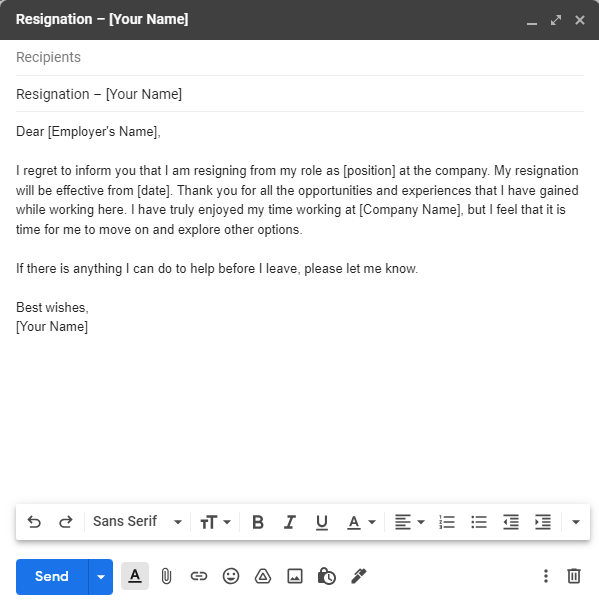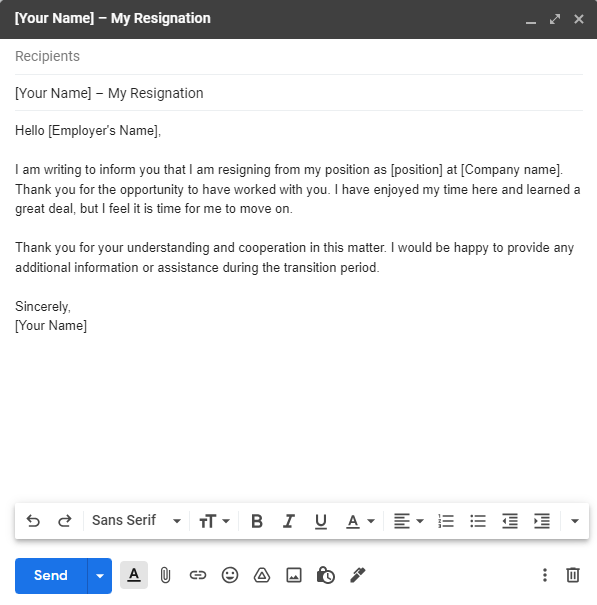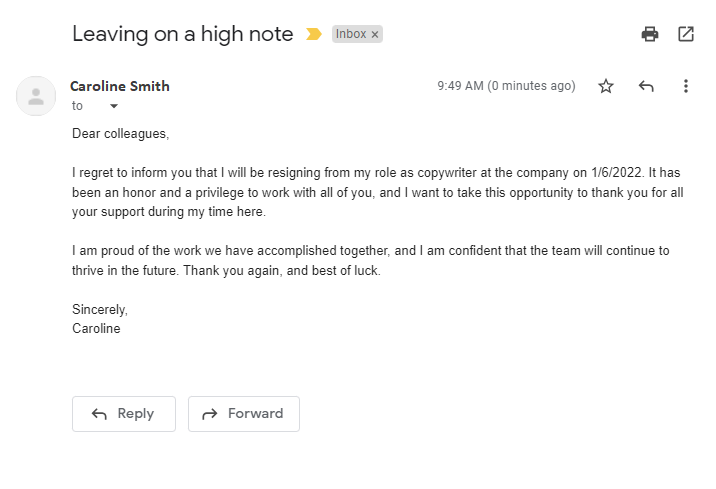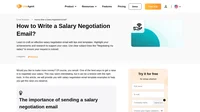- Email Templates
- How to Write a Resignation Email?
How to Write a Resignation Email?
Learn to write a professional resignation email by following proper etiquette, including necessary details, and expressing gratitude. Discover tips and templates for informing your employer and colleagues while maintaining positive relationships.

Resigning from a job can be intimidating for many people. A resignation email may seem like a difficult message to write and send, but it can be a breeze with the right template.
In this article, we will provide several examples of resignation letters that you can use when quitting your job. We will also offer a few tips on how to write a resignation email that is professional and polite.
The importance of sending a resignation email
When you want to leave your job, it is often best to send a resignation email. That’s because this type of message can serve as an official notice that you are quitting.
It allows you to thank your employer for the work opportunity. What’s more, a resignation email is a good way to maintain a positive relationship with your former employer, which can be important for obtaining future references.
It’s professional and respectful to resign in writing, whether that be through a letter or an email. It gives your employer time to process the news. Plus, it’s a record of your resignation that you and your employer can refer back to later on if needed, or if there are any disputes or misunderstandings down the line.
Sending a resignation email also allows your employer to respond, which might help smooth things over if there are any hard feelings. Additionally, it can be a good way to get closure and leave on good terms even if there were some bumps along the road during your employment.
Finally, you might also want to send a resignation email to your team members informing them of your departure and thanking them for their support. This is always a good gesture, especially if you have worked closely with them in the past.
How to title a resignation email
You should always title a resignation email with your name and the word “resigning” or “resignation” to make it clear to them what the message is about. For example, “John Smith – Resignation”.

With this approach, your employer can easily find and reference your resignation email later on if needed. Don’t add too many words in your subject line, it can make the message come across as unprofessional.
For an email to inform your colleagues or team members about your resignation, you can use a more general subject line such as “leaving the company” or “important update”. If you have a particularly strong bond with your team, you could use a subject line such as “goodbye and good luck”.
Resignation email subject line examples
- [Name] Resignation
- Resignation [Name]
- [Name] Resignation Email
- [Name] – Resignation
- Resigning from my position at [Company Name]
- Resignation from my role at [Company Name]
- A new adventure awaits
- After much thought, I’ve decided to move on
- Leaving on a high note
- Goodbye and good luck
How to write a resignation email
Writing resignation emails is not difficult, it can even be therapeutic. It’s a way to say goodbye to your current job and move on to the next phase of your career journey.
When writing a formal resignation letter, always remember to be professional and respectful. You don’t want to burn any bridges with your current employer because you never know when you might need them in the future.
Don’t overdo your resignation email. This is not the time to vent or complain about your current job or employer. Simply state your intention to resign and provide a date of when it will be effective.

You may want to include a sentence or two about your time at the company and what you have learned, but keep it brief. Your resignation email etiquette tells a lot about you as a person and a professional, so be sure to write your message with class and dignity.
What to include in a resignation email
- The date of your resignation
- Your name
- Your current position
- A statement of resignation
- The effective date of your resignation
- A thank you for the opportunity to work at the company
Resignation email examples and templates
Formal resignation email templates
Subject: My Resignation
Dear [Employer’s Name],
I wanted to let you know that I have decided to resign from my position at the company. Thank you for the opportunity to work here, I have learned a lot and it has been a privilege to be part of the team.
I will leave on [date] and I am looking forward to starting my new adventure. If there is anything else I can do before I leave, please don’t hesitate to let me know.
Thank you again for everything,
[Your Name]
Subject: [Your Name] – My Resignation
Hello [Employer’s Name],
I am writing to inform you that I am resigning from my position as [position] at [Company name]. Thank you for the opportunity to have worked with you. I have enjoyed my time here and learned a great deal, but I feel it is time for me to move on.
Thank you for your understanding and cooperation in this matter. I would be happy to provide any additional information or assistance during the transition period.
Sincerely,
[Your Name]
Subject: Resignation email from [Your Name]
Hi [Employer’s Name],
I hope you’re well. I regret to inform you that I am resigning from my position as [position] at the company. My last day at work will be [date]. Thank you for the opportunity to have worked here. I wish you all the best in the future.
Regards,
[Your name]
Subject: [Your Name] – Resignation email
Hi [Employer’s Name],
I wanted to let you know that as of [date] I will be resigning from [position]. I am grateful for everything that I have learned whilst working at the company, but I feel that now would be a good time for me to move on to further advance my career path.
Please let me know if you require me to do anything to help the company during the transition period.
Sincerely,
[Your Name]
Subject: Resignation – [Your Name]
Dear [Employer’s Name],
I regret to inform you that I am resigning from my role as [position] at the company. My resignation will be effective from [date]. Thank you for all the opportunities and experiences that I have gained while working here. I have truly enjoyed my time working at [Company Name], but I feel that it is time for me to move on and explore other options.
If there is anything I can do to help before I leave, please let me know.
Best wishes,
[Your Name]
Subject: Resigning from my position at [Company Name]
Hello [Employer’s Name],
It is with sincere regret that I am informing you about my decision to resign as of [date]. It has been a pleasure working at [Company Name] and I have grown both as a person and a professional during my employment here.
However, I believe that now is the right time for me to pursue other opportunities elsewhere. Thank you for your understanding and I would be happy to help with the transition in any way possible.
Kind regards,
[Your Name]
Subject: Resignation from my role at [Company Name]
To Whom It May Concern,
I am writing to inform you that I am resigning from my position as [position] with [Company Name]. My last day of work will be on [date].
Thank you for the opportunity to work at this company. I have enjoyed my time here and am grateful for the skills and experience I have gained. I wish you all the best in the future.
Sincerely,
[Your Name]
Resignation email template informing colleagues
Subject: Leaving a great team
Hi Team,
After much thought, I have decided to resign from my position as [position] at [company]. I want to thank you all for the opportunity to work with you and for the great memories. I wish everyone all the best in the future.
[Your name]
Subject: My resignation from [Company Name]
Hi all,
Although I have sincerely enjoyed my time at [Company Name], I am writing to inform you that I am resigning from my position. Thank you for the opportunity to have worked with all of you, and I wish the best for everyone in the future.
Kind regards,
[Your Name]
Subject: Farewell [Company Name]
Hello Team,
This email is to inform you that I am resigning from my position at [Company Name]. It has been a pleasure working with all of you, and I want to thank you for the opportunities and experiences you have provided me with.
Good luck in your future endeavors.
Best,
[Your Name]
Subject: A new adventure awaits
Dear Team Members,
I am writing to let you know that I am resigning from my current position at [Company Name]. It has been an amazing experience working with all of you, and I want to thank you for everything.
I have thoroughly enjoyed my time here, but I am ready to move on to new challenges. Thank you again for everything and best of luck for the future.
Sincerely,
[Your Name]
Subject: After much thought, I’ve decided to move on
Hi everyone,
I wanted to let you know that I have informed the company of my decision to resign, effective on[date]. It’s been a difficult decision to make, but I feel it’s the right time for me to move on.
Thank you all for the support and opportunities during my time here. I wish everyone the best of luck in the future.
Best wishes,
[Your Name]
Subject: Leaving on a high note
Dear colleagues,
I regret to inform you that I will be resigning from my role as [position] at the company on [date]. It has been an honor and a privilege to work with all of you, and I want to take this opportunity to thank you for all your support during my time here.
I am proud of the work we have accomplished together, and I am confident that the team will continue to thrive in the future. Thank you again, and best of luck.
Sincerely,
[Your Name]
Subject: Goodbye and good luck
Hi everybody,
I wanted to let you all know that I have submitted my resignation and my last day at the company will be [date]. It has been a great experience working with all of you, and I want to thank you for everything that you have done to make my time working at [Company Name] a real pleasure and a privilege.
Hopefully, I will have the opportunity to say goodbye to everyone in person, but for now, let me just wish you all the best of luck in the future.
Kind regards,
[Your Name]
Resignation email good practices
When resigning from a job, it’s important to maintain a positive professional relationship with your former employer. You may need them as a reference in the future, or you might want to keep them in touch with your career growth.
Here are some tips for drafting a resignation email:
- Thank your employer for the opportunity they gave you – even if you didn’t enjoy the job, there’s always something to be thankful for.
- Keep it brief – there’s no need to go into detail about your reasons for leaving, just state that you are resigning and provide the intended date.
- Maintain a positive tone – this is not the time to vent or complain.
- Say that you enjoyed your time at the company and mention some of the good times you had.
- Express gratitude for all the lessons you have learned while working there.
- Keep things brief and professional – avoid getting into any personal details about why you’re leaving or what your future plans are. A simple statement is all that’s needed.
- Be polite and respectful, thanking the company for the opportunity they’ve given you.
- Make sure your contact information is up to date – include your current, non-company email address and phone number so that your soon-to-be former employer can reach out to you if needed.
- Keep a copy of the email for yourself – this will serve as proof of notification in case there are any issues concerning your departure later on.

Resignation email common mistakes to avoid
When writing a resignation email, be sure to avoid these common mistakes:
- Don’t vent or complain about your current situation – this will only damage your relationship with the company.
- Don’t threaten legal action or make any demands – this is not the time to negotiate for a higher severance package or better working conditions.
- Don’t badmouth your colleagues or the company – you never know when you’ll need them in the future.
- Don’t be too specific in your resignation email. You don’t need to go into detail about why you’re leaving or what your next steps are – keep it short, sweet, and to the point.
Essential Videos to Watch Prior to Drafting a Resignation Email


Summary
When resigning from a job, it’s important to be respectful and keep things brief – you don’t want to close any doors for the future. Follow our tips for drafting a resignation email, and you’ll be on your way to starting afresh in your new job in no time.
Remaining professional even if the employment has not ended amicably is a real sign of character, and may serve your career well down the line. If appropriate, you may decide to send a resignation email to your colleagues as well as your employer to let them know about your decision to move on and show gratitude for your time working together.
And remember, always keep a copy of your resignation email for your records.
Make your email communication effective
Start your free 30-day trial and switch to LiveAgent ticketing system to handle all of your email communication. Get access to premium features that help you write better and save your time.
Frequently Asked Questions
Do I have to send a resignation email?
There are a few instances when it might be better to deliver your resignation in person. If you have a close relationship with your boss or if there are extenuating circumstances then a face-to-face resignation might be best. In most cases, however, an email is perfectly acceptable.
How do I format a resignation email?
When formatting your resignation email, be sure to include your name, the date, and your contact information. Apart from that, there is no set format for resignation emails, so you can keep them as brief or as detailed as you like. Check out the templates above for some more inspiration.
When should I send a resignation email?
Ideally, you should send your resignation email as soon as you have decided to leave. This will allow your employer to start making arrangements for your departure and to begin the process of finding a replacement.
What if I don't have a positive relationship with my employer?
Even if you don’t have a positive relationship with your employer, it’s important to be respectful in your resignation email. This is your last opportunity to leave on good terms, so take the high road and remain professional.
What should I say in a resignation email?
In your resignation email, you should simply state that you are resigning and provide a date when you plan to leave, as well as your contact details (e.g. non-company email address). There is no need to go into detail about why you are leaving or what your plans are – a brief resignation email is all that’s needed. You can also thank the company for the opportunity they’ve given you if you feel that it would be appropriate to do so.
What are the most important things to keep in mind when writing a resignation email?
When writing a resignation email, it’s important to be respectful and professional. This message is your last opportunity to leave on good terms with your employer. Be concise, keeping your email brief and to the point – inform your employer of your intentions, let them know when you plan to leave, and offer any help you can during the transition period.
How do I handle telling my boss and co-workers about my decision to leave the company?
It might sometimes be best to inform your boss and co-workers of your resignation in person, rather than through email. This will allow you to have a conversation about your resignation and answer any questions they might have. You can also use this opportunity to provide them with written notice of resignation (if required by your company) and to thank them for your time working together. However, a well-written email is perfectly acceptable for both starting the formal resignation process and informing your colleagues about your decision.
Is there anything else I should do after sending my resignation email?
If you haven’t already, be sure to give your employer the required notice of resignation according to your employment contract. This is usually two weeks, but it could be more or less depending on the company. Once you’ve given notice and your resignation has been accepted, you can start packing up your belongings and saying goodbye to your co-workers. If you have any outstanding projects, try to wrap them up before you leave so that the transition for your replacement will be as smooth as possible.
Should I include a reason for quitting in my resignation email?
No, there is no need to go into detail about your reasons for leaving. A simple statement of resignation is all that’s needed. If you want to, you can mention some of the good times you had at the company or express gratitude for what you learned while working there.
Boost your sales with LiveAgent's break-up email templates! Discover 10 effective templates to revive cold prospects and improve response rates. Tailored for various scenarios, these emails help you make a lasting impression, clear your pipeline, and set up future follow-ups. Try LiveAgent for free and handle difficult conversations with ease.
Follow up email after no response
Boost your email response rate with effective follow-up strategies! Learn how to craft polite follow-up emails after no response with tips on subject lines, writing techniques, and free templates for various scenarios like job applications and meetings. Discover how to improve your communication and increase engagement effortlessly.
How to Write a Salary Negotiation Email?
Master salary negotiations with professional email templates and tips to secure the raise you deserve. Elevate your career now!
You will be
in Good Hands!
Join our community of happy clients and provide excellent customer support with LiveAgent.

Our website uses cookies. By continuing we assume your permission to deploy cookies as detailed in our privacy and cookies policy.

 Български
Български  Čeština
Čeština  Dansk
Dansk  Deutsch
Deutsch  Eesti
Eesti  Español
Español  Français
Français  Ελληνικα
Ελληνικα  Hrvatski
Hrvatski  Italiano
Italiano  Latviešu
Latviešu  Lietuviškai
Lietuviškai  Magyar
Magyar  Nederlands
Nederlands  Norsk bokmål
Norsk bokmål  Polski
Polski  Română
Română  Русский
Русский  Slovenčina
Slovenčina  Slovenščina
Slovenščina  简体中文
简体中文  Tagalog
Tagalog  Tiếng Việt
Tiếng Việt  العربية
العربية  Português
Português 





